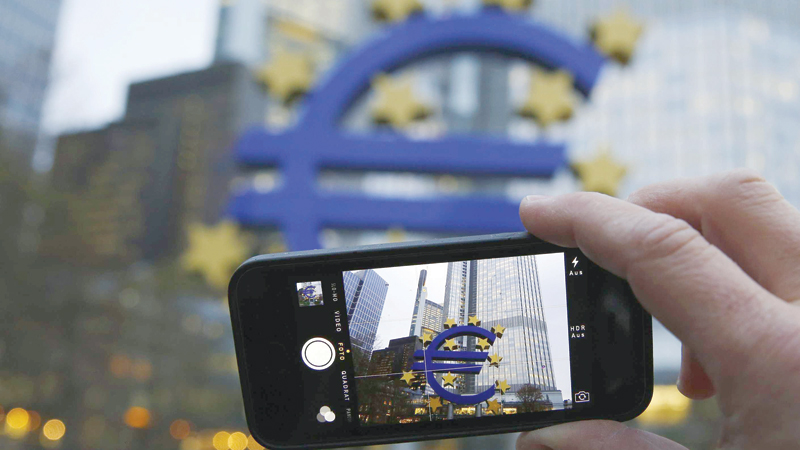

LONDON: Euro zone business growth slowed much faster than expected this month, dragged down by waning orders that put a big dent in confidence, adding to evidence the bloc’s halcyon days are behind it for now, a survey showed.
October’s disappointing survey is likely to concern policymakers at the European Central Bank, who are expected to end their bond-buying programme in less than three months, despite a slew of political and trade concerns.
The economic slowdown comes amid an escalating trade war between the United States and China, a spiralling debt dispute in Italy, deadlocked Brexit negotiations and the prospect of steadily tightening financial conditions.
Both the euro and euro zone government bond yields dropped on Wednesday after the survey’s release, with the single currency falling half a per cent to $1.1417, its lowest since August 20.
Markets have taken a battering recently and European stocks were trading near a two-year low on Tuesday, down 20 per cent from their peak, but the index rose 0.6 per cent on Wednesday.
“The euro area economy is clearly suffering from the uncertainty created by the trade war and weaker global growth momentum, and the weakness is spreading to the domestic economy,” said Jan von Gerich at Nordea. “The weak PMI data clearly increase downside risks to the euro area growth outlook.” Indeed, the outlook for global growth in 2019 has dimmed for the first time, according to polls of economists, who are also concerned about the US-China trade war and have repeatedly said euro zone growth is well past its peak.
ECB policymakers have slowly trimmed asset purchases, hoping they have done enough to bolster growth and inflation and are expected to hold policy steady on Thursday — despite evidence euro zone growth momentum peaked some time ago.
“Amid the fiscal stand-off between Rome and Brussels as well as increasingly jittery global markets, the ECB is likely to stress caution,” said Stephen Brown at Capital Economics.
IHS Markit said if the survey levels were maintained, they pointed to fourth quarter growth of 0.3 per cent. That would be the slowest pace in 2 1/2 years and below the 0.4 per cent predicted in a Reuters poll earlier this month.
Earlier figures from Germany, Europe’s biggest economy, showed private-sector growth slowed to its weakest in more than three years as manufacturing and services both lost momentum.
Germany’s Chambers of Industry and Commerce, DIHK, last week cut its 2018 growth forecast and predicted a slowdown next year as the country faces mounting risks at home and abroad. It predicted 2019 growth of 1.7 per cent, below a poll forecast of 1.8 per cent. — Reuters
Oman Observer is now on the WhatsApp channel. Click here



